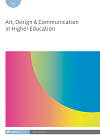
Full text loading...

Cognitive psychologists have identified that introducing manageable challenges into the learning environment, coined as ‘desirable difficulties’ by Robert Bjork, helps students retain knowledge more deeply over time. Handling small, workable obstacles in the learning process slows down the learner and can have positive effects on retention and application. The more effort learners must apply to retrieve knowledge for a concept or skill, the more this process of retrieval enriches learning. While there is established literature on desirable difficulty in the field of cognitive psychology, the theory has not been applied to design education. The characteristics of the signature pedagogy of design naturally contain many of the key markers of desirable difficulty that drive learning retention. This article summarizes the major scholarship around the concept of desirable difficulty and explores applications for the teaching and learning of design, specifically around the signature pedagogy elements of critique, the design process and project-based learning.

Article metrics loading...

Full text loading...
References


Publication Date:
https://doi.org/10.1386/adch_00014_1 Published content will be available immediately after check-out or when it is released in case of a pre-order. Please make sure to be logged in to see all available purchase options.